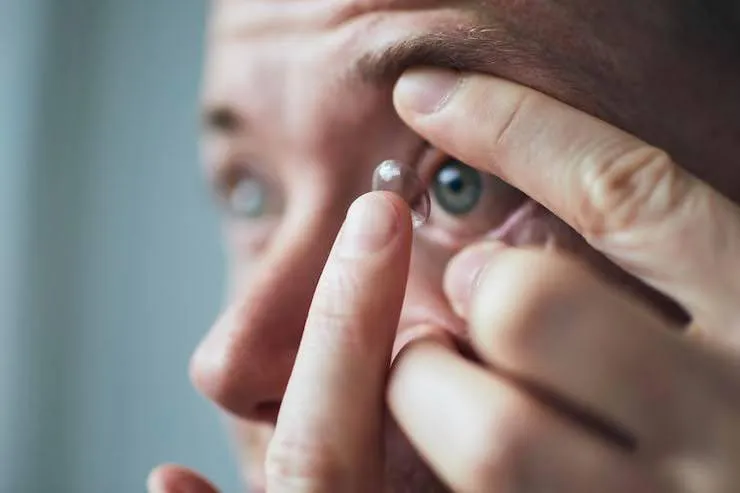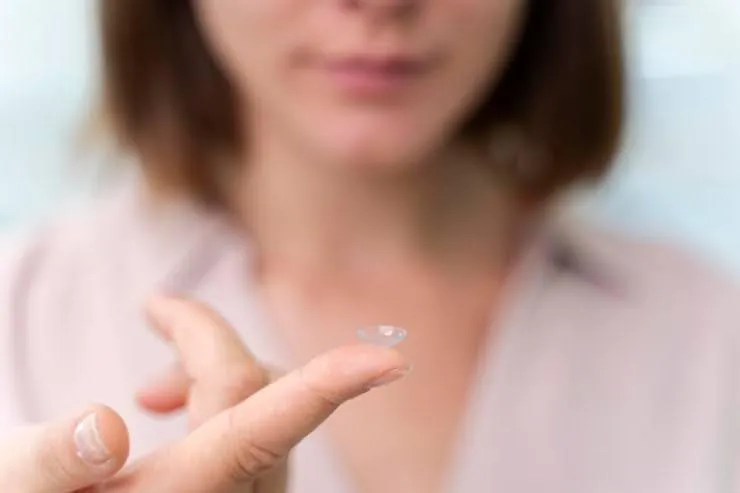Lens Comfort
Solving Contact Lens Discomfort Tips
FSDAVCFEBFEVSDDVFSD
FSDAVCFEBFEVSDDVFSD
FSDAVCFEBFEVSDDVFSD
Why Contacts May Hurt
Experiencing contact lens discomfort can be frustrating, especially when irritation or dryness makes wearing lenses feel like a chore. A common culprit is dry eyes contacts, where eyes don't produce enough tears or wearers blink less while using screens. This reduced moisture can leave lenses feeling gritty and uncomfortable, making daily wear a challenge.
However, discomfort may also result from other causes such as an improper fit, old prescription, protein buildup, allergies, or environmental factors. The good news is there are many effective uncomfortable contacts solutions—from rewetting drops to lens material upgrades or even specialty lens fittings, offering relief and restoring comfort for lens wearers.
Experiencing contact lens discomfort can be frustrating, especially when irritation or dryness makes wearing lenses feel like a chore. A common culprit is dry eyes contacts, where eyes don't produce enough tears or wearers blink less while using screens. This reduced moisture can leave lenses feeling gritty and uncomfortable, making daily wear a challenge.

However, discomfort may also result from other causes such as an improper fit, old prescription, protein buildup, allergies, or environmental factors. The good news is there are many effective uncomfortable contacts solutions—from rewetting drops to lens material upgrades or even specialty lens fittings, offering relief and restoring comfort for lens wearers.

Common Contact Lens Causes & Fixes
Dry eyes are a leading cause of discomfort for many contact lens wearers. If your eyes feel dehydrated, using preservative‑free rewetting drops throughout the day can offer relief. You might also benefit from switching to lenses designed for moisture retention or exploring the best contacts for dry eyes. In some cases, treating underlying dry eye disease is necessary. Kleinwood Vision provides specialized dry eye care services that can significantly enhance long-term comfort and improve your overall lens-wearing experience.
The lens material or type you use can also impact comfort. Older lenses or those with low oxygen permeability often cause irritation and make your eyes feel tired. Upgrading to silicone hydrogel or daily disposables can make a big difference. Daily lenses help minimize deposit buildup and exposure to allergens, which supports better eye health and provides consistent, all‑day comfort for those with sensitive or allergy-prone eyes.
A poor fit or outdated prescription can cause redness, discomfort, or lens movement. A professional contact lens fitting Houston ensures that the base curve, diameter, and power match your eyes. If you experience lens redness, slipping, or vision blur, it’s likely time for a proper refit and lens evaluation.
Managing Contact Lens Build‑Up & Allergies

Protein or debris buildup—especially common with monthly lenses—is a major cause of irritation and discomfort for many contact lens users. Over time, residue from natural tear proteins, lipids, and environmental debris accumulates on the lens surface, leading to a gritty, cloudy sensation. To address this, consistent and thorough nightly cleaning using a rub‑and‑rinse technique is essential. Additionally, occasional deeper cleaning with peroxide systems can help remove stubborn deposits and restore lens clarity.
For many wearers, switching to disposable lenses, particularly daily disposables, is the easiest solution.

These lenses are discarded after one use, effectively eliminating the risk of buildup forming. This switch improves comfort and promotes better eye health by reducing exposure to irritants and bacteria that accumulate on reused lenses. If buildup persists, your eye care provider may suggest changing your lens material or cleaning routine to maintain optimal comfort and hygiene.
Seasonal allergies and environmental irritants such as pollen and dust can also cling to lenses and worsen discomfort. These allergens may trigger symptoms like redness, watering, and itchiness, particularly during high-pollen months. In such cases, switching to daily lenses during allergy season can be highly effective, as each new pair of lenses starts clean, without accumulated allergens.
Other uncomfortable contacts solutions for allergy sufferers include using allergy‑safe drops approved for contact users. These drops help soothe the eyes and reduce inflammation without damaging the lenses or causing further irritation. It's important to avoid generic eye drops not made for contact lenses, as they may contain preservatives or ingredients that interfere with lens clarity or comfort. Working with your eye doctor to manage both build-up and allergies ensures that your contact lens experience remains clear, comfortable, and safe throughout the year.
Lifestyle and Effective Blink Strategies
Environmental factors such as dry air from AC, heat, or wind can cause contact lenses to dry out quickly, leading to discomfort. To combat this, using a humidifier, wearing wrap‑around glasses, or taking regular screen breaks helps preserve the natural tear film. Additionally, performing intentional blinks during screen time or following the 20‑20‑20 rule supports lubrication and reduces eye strain, keeping your eyes comfortable throughout the day.
Overextending lens use—like wearing two‑week lenses beyond their intended replacement time—can result in a loss of wettability and increased discomfort. Sticking to your prescribed replacement schedule ensures better hygiene and maintains comfort. Staying hydrated systemically also supports healthy tear production, which is crucial for overall lens comfort and eye health. Together, these lifestyle and care strategies help keep your lenses comfortable and your eyes healthy.
When Fit Or Health Issues Arise
If symptoms persist—even with better drops or a new lens type—it may indicate a poor lens fit or early eye health issues like giant papillary conjunctivitis (GPC) or corneal irritation. A professional contact lens fitting Houston can identify these and recommend a new fit or lens design to improve comfort.
An in-office evaluation helps rule out hidden causes of discomfort such as early infection, eyelid inflammation, or GPC. Taking a temporary break from contacts while the eye heals, followed by refitting, often provides relief and a fresh start.
If symptoms persist—even with better drops or a new lens type—it may indicate a poor lens fit or early eye health issues like giant papillary conjunctivitis (GPC) or corneal irritation. A professional contact lens fitting Houston can identify these and recommend a new fit or lens design to improve comfort.
An in-office evaluation helps rule out hidden causes of discomfort such as early infection, eyelid inflammation, or GPC. Taking a temporary break from contacts while the eye heals, followed by refitting, often provides relief and a fresh start.


For some wearers, specialty contact lenses offer comfort when conventional lenses fall short. These include high-water lenses, scleral lenses, or lenses designed for dry eye, providing advanced fitting options for those needing extra care and comfort.
Choosing the Right Contact Lenses
Addressing contact lens discomfort often starts with evaluating the lens type and fitting. Among the best contacts for dry eyes, silicone hydrogel daily disposables are highly recommended because they provide enhanced moisture retention and improved oxygen flow. These daily replacement lenses eliminate cleaning hassles, significantly reducing deposit buildup and the risk of bacterial contamination. For many wearers, switching to daily disposables leads to noticeably better comfort and overall eye health.
For individuals with more severe dry eye or sensitivity, specialty contact lenses such as scleral lenses or hybrid lenses offer a protective tear reservoir that cushions the eye and maintains moisture throughout the day. Their unique design also provides a superior fit compared to standard lenses, crucial for those struggling with persistent discomfort. At Kleinwood Vision, specialists expertly fit these advanced lenses to help solve ongoing discomfort and provide personalized care
If a poor fit or outdated prescription is identified, refitting with the correct base curve, diameter, and power can quickly relieve irritation and improve vision. When deposits or allergies contribute to symptoms, switching to daily wear lenses or changing brands may resolve the issue. Many discomfort problems can be managed through careful assessment and open communication with your eye doctor.
Regular follow-ups are essential to monitor evolving eye conditions. Early signs of inflammation or giant papillary conjunctivitis (GPC) may require tailored cleaning regimens or temporary lens discontinuation. Early detection and treatment safeguard comfort and overall eye health, ensuring a better long-term contact lens experience.
Quick Tips for Contact Lens Comfort
To maintain comfort while wearing contact lenses, it’s essential to use preservative-free rewetting drops at the first sign of dryness and keep them handy throughout the day. These drops help relieve irritation and keep your eyes feeling fresh, especially in dry or air-conditioned environments.
Alongside rewetting drops, remember to stay hydrated throughout the day and blink fully during screen use to prevent eye strain and dryness. Following your lens replacement schedule is critical—never overuse lenses beyond their intended timeframe, as this can lead to discomfort and even eye infections.

To maintain comfort while wearing contact lenses, it’s essential to use preservative-free rewetting drops at the first sign of dryness and keep them handy throughout the day. These drops help relieve irritation and keep your eyes feeling fresh, especially in dry or air-conditioned environments.
Alongside rewetting drops, remember to stay hydrated throughout the day and blink fully during screen use to prevent eye strain and dryness. Following your lens replacement schedule is critical—never overuse lenses beyond their intended timeframe, as this can lead to discomfort and even eye infections.
Choosing breathable lens materials and switching to daily disposables can significantly reduce irritation and buildup. Incorporating allergy-safe practices and staying ahead of any eye inflammation protects your vision and eye health. Most importantly, regular visits to your eye doctor help detect any problems early—because good contacts always start with healthy eyes. If you have questions or need support, contact us today.
Don’t Give Up on Contacts
Many contact lens users stop wearing their lenses due to contact lens discomfort, but often this step is unnecessary. Thanks to advances in lens materials, cleaning systems, and specialty contact lenses, most people can find a comfortable solution that fits their individual needs. Modern lenses offer improved moisture retention, better oxygen flow, and reduced buildup, all contributing to greater daily comfort—even for those with sensitive or dry eyes.
If discomfort continues, scheduling a professional fitting exam is important. At Kleinwood Vision, our experienced team works closely with each patient to troubleshoot problems and tailor lens selections to ensure maximum comfort and clear vision. With personalized care and expert guidance, comfortable contact lens wear doesn’t have to be elusive. Comprehensive contact lens support is available to help you see clearly and comfortably, so you can enjoy the benefits of contact lenses without pain or irritation.

Contact Info
Hours of Operation
Mon - Fri | 9:00 AM - 5:00 PM
Sat - Sun | Closed
Holiday Hours: We are closed for the following holidays: New Years Day, Memorial Day, Independence Day, Labor Day, Thanksgiving Day, Christmas Day
© 2026 Kleinwood Vision. All rights Reserved.


